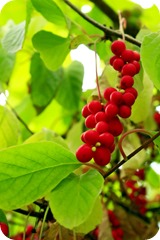 This randomized, double-blind placebo-controlled clinical trial was conducted in women between the ages of 40 and 70 who reported menopausal symptoms. Women were evaluated using two conventionally recognized scales of menopause symptoms, the Kupperman Index (KI) and the Menopause Rating Scale (MRS). Women were randomized to receive either placebo or an extract of Schisandra chinensis… with each pill containing 196 mg of natural extract, and 2 pills twice per day. Women received the treatment for 6 weeks, and then were followed for 12 weeks.
This randomized, double-blind placebo-controlled clinical trial was conducted in women between the ages of 40 and 70 who reported menopausal symptoms. Women were evaluated using two conventionally recognized scales of menopause symptoms, the Kupperman Index (KI) and the Menopause Rating Scale (MRS). Women were randomized to receive either placebo or an extract of Schisandra chinensis… with each pill containing 196 mg of natural extract, and 2 pills twice per day. Women received the treatment for 6 weeks, and then were followed for 12 weeks.
Daily diaries, questionnaires and laboratory studies were performed at baseline, 6 weeks and 12 weeks.
The primary endpoint was the average interval change in KI score from baseline to week 12 with secondary outcomes including laboratory studies and the MRS for sexual and bladder problems. Thirty six women completed the study.
Results: In the Schisandra group, the KI score decreased by 21.6% at the 6 week visit and by 41.2% at the 12-week visit. In the placebo group, the KI score decreased by 12.6% at the 6 week visit and 27.2% at the last visit. The specific symptoms for which Schisandra helped were hot flushes, sweating and heart palpitations and the rates of reduction were about 50% from the beginning to the end. The MRS scores for sexual problems and urinary problems revealed no significant differences between the herbal group and the placebo group. Estradiol serum levels were slightly increased in the herbal group, but was not statistically significant compared to placebo.
Commentary: Schisandra chinensis is a berry whose name means “five flavors” in Chinese: salty, sour, bitter, spicy(pungent) and sweet. In traditional Chinese medicine, it has been used for thousands of years for the common cold, kidney diseases and memory improvement. Modern research has investigated it’s use in vascular diseases and Alzheimer’s disease. Schisandra chinensis should be added to the list of botanicals demonstrating some scientific efficacy for menopausal related hot flushes/ night sweats and heart palpitations.
References: Park J, Kim K. A randomized, double-blind, placebo-controlled trial of Schisandra chinensis for menopausal symptoms. Climacteric. 2016 Dec;19(6):574-580.

